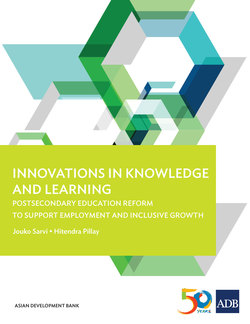Innovations in Knowledge and Learning

Реклама. ООО «ЛитРес», ИНН: 7719571260.
Оглавление
Jouko Sarvi. Innovations in Knowledge and Learning
INNOVATIONS IN KNOWLEDGE AND LEARNING
Contents
Figures
Abbreviations
Executive Summary
Background and Context. Disruptive innovation in education to support inclusive development
Rethinking the postsecondary education space
Governance and Regulations. Legislation to increase access to and diversification of programs
Quality assurance of postsecondary education
Diversification of Education and Training Service Providers
Public-sector institutions
Private-sector institutions
Cross-border providers
Pathways in Program Design. Structural issues
Content issues
Preservice vs continuous professional development
Delivery Modalities and Challenges. Traditional institution-based face-to-face
Online and hybrid modality
Final Remarks
References
Footnotes
Отрывок из книги
POSTSECONDARY EDUCATION REFORM TO SUPPORT EMPLOYMENT AND INCLUSIVE GROWTH
Jouko Sarvi • Hitendra Pillay
.....
A range of innovative modalities for partnerships among local public and private providers and with internationally recognized private and public education service providers is becoming the norm. Development partners’ support and philanthropy are also helping strengthen public postsecondary education services. While investments in infrastructure and physical facilities may be necessary, they need to be conceptualized and built to maximize utilization—the luxury of having dedicated facilities for each level (technical and vocational education and training, polytechnic, university) and at each institution may no longer be possible. Overzealous competition can undermine collaborative opportunities to achieve mutual benefits. Often, reinventing programs, duplicating open educational resources, building dedicated online platforms, etc. are driven by non-education agendas and seriously undermine the expansion and quality of education services.
The push for highly qualified human resources in DMCs has unintentionally skewed the focus toward university degrees and selected highly specialized areas when the human resources needs of many DMCs are very diverse. This has led human resource development programs to be out of sync with workforce demands, resulting in an increasing incidence of overqualified graduate unemployment in some DMCs. This mismatch is being partly remedied by additional training, often in practical skills, or by lower paid jobs, which risks creating wage distortions. Obtaining a perfect match may not be possible; however, providing flexibility—by having core foundational subjects and options to choose courses to supplement evolving knowledge gaps—may be possible. Programs around “knowledge clusters” can help graduates adapt to emerging demand areas without having to go through extended retraining programs or start new degrees. This requires transparent articulation between programs and pathways. The increase in portfolio workers1 and self-employment requires workers to be equipped with knowledge, skills, and applications within their respective knowledge clusters. Also, the increasing use of technology to continuously support professional discussion forums is gradually providing an alternative means for individuals and institutions to respond to the ubiquity of knowledge and learning, and the continuous need to upgrade oneself.
.....